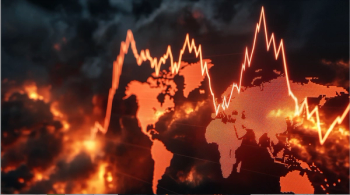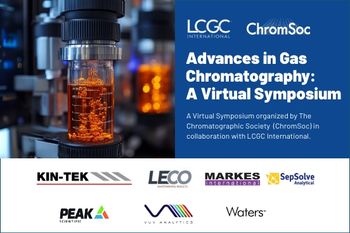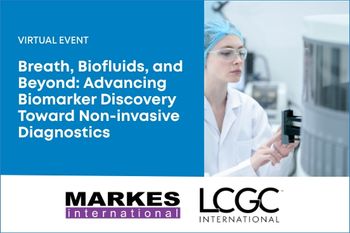
- LCGC North America-11-01-2009
- Volume 27
- Issue 11
The Minnesota Chromatography Forum's 30th Anniversary
Peter Johnson gives readers the history of the well-known Minnesota Chromatography Forum.
The Minnesota Chromatography Forum (MCF) was born in the minds of a few area chromatographers in early 1978. It took final shape on St. Patrick's Day over a pitcher of green beer. The attendees reflected diverse interests in chromatography: Mr. Steve Anderson (Cargill, Inc.), Mr. Larry Bell (Larry Bell and Associates), Dr. Larry Bowers, Dr. Mark Brenner and Dr. Peter Carr (University of Minnesota), and Mr. Don Hagen (3M Company).
In 1979, a constitution was written and adopted, and the MCF was incorporated as a nonprofit, tax-exempt organization. The objectives of the MCF were ". . . to maintain and promote an interest in, and to provide for, education, discussion, and exchange of information with respect to all fields of chromatography." To address these objectives, four technical meetings were held in 1979, including a notable address by Dr. Les Ettre. The first annual MCF Spring Symposium and Exposition was also held in 1979. Chromatographers from the Dakotas, Iowa, and Wisconsin joined those from Minnesota to present and discuss the varied topics of contemporary chromatography. The Spring Symposium was highlighted by a keynote address presented by Professor Barry Karger of Northeastern University.
Figure 1: Les Ettre is presented the first L.S. Palmer Award by Professor Mark Brenner in 1980.
In 1980, the MCF continued to grow and expand. New ventures included an invited lecture by Professor Roland Frei (Free University of Amsterdam) and a short course on capillary column gas chromatography, taught by Dr. Walt Jennings and Dr. Les Ettre. The 2nd Annual Spring Symposium and Exposition included a keynote presentation by Dr. Walt Jennings (University of California, Davis), the presentation of the first L.S. Palmer Award to Les Ettre, 30 contributed technical papers, and 28 exhibitors.
Figure 2: Walt Jennings receiving the L.S. Palmer Award from John Marhevka (left) and Jon DeVries (center) at the 1983 MCF Spring Symposium.
The MCF is managed by a board that includes president, president-elect, past-president, secretary, secretary-elect, treasurer, and three directors. The annual events of the MCF are supported by several committees: the Spring Symposium Committee, the Education Committee, the Newsletter Committee and the Membership Committee. The following sections summarize the annual events of the MCF.
Figure 3: Professor Gerhard Schomburg was a quarterly speaker in 1986.
Quarterly Technical Meetings
The quarterly technical meetings are arranged by the individual MCF directors. Over the years, various themes and venues have been popular. The technical meetings that were hosted in the hospitality rooms of the Hamm's and Schmidt breweries were always well attended. The spring technical meeting typically was scheduled near the date of Pittcon to accommodate the itinerary of an international guest speaker. Professor David (Dai) Games (University of Wales, Swansea) once commented, "My friends will never believe that I was invited to give a lecture at a brewery."
Figure 4: Celebrating the 10th anniversary of the founding of the MCF on St. Patrick's Day: From left to right, Mark Brenner, Peter Carr, Fred Gustafson, Don Hagen, Larry Bell, Steve Anderson, and Steve Pierson.
Short Courses
The MCF Education Committee sponsors at least five short courses per year. Three or four short courses are held in conjunction with the Spring Symposium, and two to four short courses are held at other times during the year. The "Introduction to Gas Chromatography" short course has been offered since 1981. In the past, it has been taught by Professor Gary Reineccius (University of Minnesota), Mr. John Freeburg (Agilent), and Mr. Rick Rossiter (3M Company), with laboratory instrumentation provided by Dr. Reineccius and local vendors.
Figure 5: Instructors for the perennial MCF short course, "Introduction to GC," Gary Reineccius (left) and John Freeburg (center, circa 1982).
Annual Spring Symposium and Exhibition
In May 2009, the MCF celebrated its 30th Annual Spring Symposium and Exhibition. The cornerstones of the Spring Symposium are short courses, an equipment exhibition, and technical presentations. Three decades ago, the science and technology of chromatography were changing dramatically on an annual basis, and the MCF Spring Symposium played a vital role in providing local chromatographers with current information in regard to new instrumentation and technical applications. Over the years, the MCF Spring Symposium has also become a popular reunion venue for local chromatographers. Colleagues who have changed jobs look forward to meeting each other every year at the MCF Spring Symposium.
Figure 6: Program chairman Peter Johnson (center) was thrilled to host Professors Csaba Horvath and Peter Carr (left and right) at the 2001 MCF Spring Symposium.
The MCF Spring Symposium is a three-day event, beginning with short courses that last for one and a half days. The short courses always include a high performance liquid chromatography (HPLC) and a gas chromatography (GC) topic, as well as one or two other topics related to chromatography or mass spectrometry. This year, the courses were "HPLC Troubleshooting" taught by John Dolan of LC Resources, "Advanced GC Troubleshooting" taught by Daron Decker of Agilent Technologies, and "Mass Spectral Interpretation" taught by Fred Feyerherm of Agilent Technologies.
Figure 7: Instructors for the 2003 Spring Symposium Short Course, "GC Troubleshooting," Darron Decker and Stuart Cram.
A broad spectrum of complementary events are offered on the afternoon of the second day. Attendees can choose from Special Topic Discussion Sessions, Vendor Seminars, and the Equipment Exposition. This year, John Dolan and Dick Henry led the HPLC Special Topic Discussion Session, and Daron Decker led the GC Special Topic Discussion Session. These sessions strive to address current technical issues from local chromatographers.
Figure 8: GC short course instructors at the 2004 MCF Spring Symposium (left to right) Daron Decker, Professor Walt Jennings, and John Freeburg.
Vendor Seminars are offered concurrently with the Special Topic Sessions. Exhibitors who participate in the Equipment Exhibition are offered complimentary time slots for Vendor Seminars.
The Equipment Exhibition is scheduled for the afternoon and early evening of the second day. Approximately 40 exhibitors participate in the Equipment Exhibition. The support of exhibitors is essential to the success of the MCF Spring Symposium, and attendees look forward to browsing for information among the booths. After the conclusion of the Special Topic Sessions and Vendor Seminars, a Welcome Reception is offered in the exhibits area. In addition, technical posters are on display in the exhibits area, and poster authors are at their posters during the Welcome Reception.
Figure 9: John Dolan as Keynote Speaker at the 2005 MCF Spring Symposium. John also has been a Focus Speaker at the Spring Symposium and at quarterly meetings, taught LC short courses, and hosted the LC Special Topics discussion session at recent Spring Symposia.
The third day of the MCF Spring Symposium is dedicated to Technical Presentations and the Equipment Exhibition. The plenary session begins with the presentation of the L.S. Palmer Award and the MCF Undergraduate Research Award, followed by the Keynote Presentation. The Keynote Speaker for the 30th Anniversary of the Spring Symposium was Dr. Larry Bowers, a co-founder of the MCF, and now the Chief Science Officer for the US Anti-Doping Agency. Recent Keynote Speakers include Professor John Dorsey, Professor Jim Jorgenson, Dr. Lloyd Snyder, Dr. Tom Layloff, Dr. John Dolan, Professor Csaba Horvath, and Professor Peter Carr (also a co-founder of the MCF).
Following the Keynote Session, the Equipment Exhibition is opened for the day, and three concurrent sessions of Technical Presentations are commenced. The Technical Presentations are drawn from submitted abstracts, as well as invited Focus Speakers. Recent HPLC Focus Speakers include Dr. Ron Majors, Professor Peter Schoenmakers, Dr. Brian Bidlingmeyer, and Dr. Stuart Cram. Recent Gas Chromatography Focus Speakers include Professor Nicholas Snow, Professor Eugene Barry, Dr. Walter Jennings, Professor Robert Synovec, Dr. Robert Mustacich, and Professor Richard Sacks. Recent Mass Spectrometry Focus Speakers include Dr. Hernan Cortes, Dr. David Muddiman, Dr. Stephen Naylor, and Dr. Don Hunt. Recent Electrochromatography Focus Speakers include Professor Gyula Vigh, Professor Douglas Gilman, Professor Charles Lucy, Professor Staffan, Nilsson, and Dr. Mark Schure.
Figure 10: Professors Larry Bowers and Peter Carr were supported by the MCF to bring the HPLC-94 Conference to Minneapolis.
Before the afternoon break, a plenary session is held for a technical presentation by the winner of the previous year's MCF Undergraduate Research Award. The caliber of the research and the presentation reflects the excellent quality of undergraduate research in chromatography. Recent Undergraduate Research Award topics include, "Detection of Sulfonamides in Wastewater via High-Performance Liquid Chromatography and Solid-Phase Extraction," "Chiral Ionic Liquids As Stationary Phases in Gas Chromatography," "LC–EC Analysis of Amino Acids on Diamond Thin-Film Electrodes," and "Development of an HPLC Method for Flavinoids in Human Cord Blood."
L.S. Palmer Award
The L.S. Palmer Award is presented at the MCF Spring Symposium in honor of Leroy Sheldon Palmer (1887–1944), a former professor and head of the Division of Agricultural Biochemistry at the University of Minnesota. In 1914, Palmer published his thesis work entitled "Carotin — The Principal Yellow Pigment in Milk Fat" at the University of Missouri. It was one of the first papers to apply a chromatographic separation to a real-life problem, and it closely followed Tswett's controversial and pioneering work in chromatography. In 1919, Palmer moved to the University of Minnesota. In 1922, Palmer's monograph was the first such volume published by the American Chemical Society, and it is generally credited with popularizing chromatography and providing specific applications that sparked interest in the area. The purpose of the L.S. Palmer Award is to recognize contributions to the science of chromatography and to the Minnesota Chromatography Forum. See Table I for previous recipients of the L.S. Palmer Award.
Table I: L.S. Palmer Award Winners
MCF Undergraduate Research Award
The MCF Undergraduate Research Award is designed to encourage undergraduate research in which chromatography plays an important role. Research proposals are solicited from undergraduates and faculty advisors at regional colleges and universities. The award is presented at the Spring Symposium, where the awardee receives a research award of $4000, plus an invitation to present the research results at the subsequent Spring Symposium. The MCF Undergraduate Research Award has been presented annually since 1986.
MCF Web Page
Additional information about the Minnesota Chromatography Forum, as well as MCF sponsored events, can be found at the MCF web page:(
Peter R. Johnson is a research specialist with 3M Drug Delivery Systems, St. Paul, MN 55144. Peter is currently serving as the Program Chair for the Minnesota Chromatography Forum's Spring Symposium. Peter has also served the MCF as President, Director, Symposium Chair, Symposium Facilities Chair and Newsletter Editor. Peter received the MCF L.S. Palmer Award in 2000 for his contributions to the MCF and the field of chromatography.
Articles in this issue
about 16 years ago
Extreme Leaksabout 16 years ago
Short Coursesabout 16 years ago
Kinetic Plots Made Easyabout 16 years ago
Analytical Method Validation: Back to Basics, Part Iabout 16 years ago
Calendarabout 16 years ago
Current Trends in HPLC Column Usageabout 16 years ago
Taking the Industry's Pulse After a Challenging 2009about 16 years ago
Buffer Considerations for LC and LC–MSNewsletter
Join the global community of analytical scientists who trust LCGC for insights on the latest techniques, trends, and expert solutions in chromatography.




